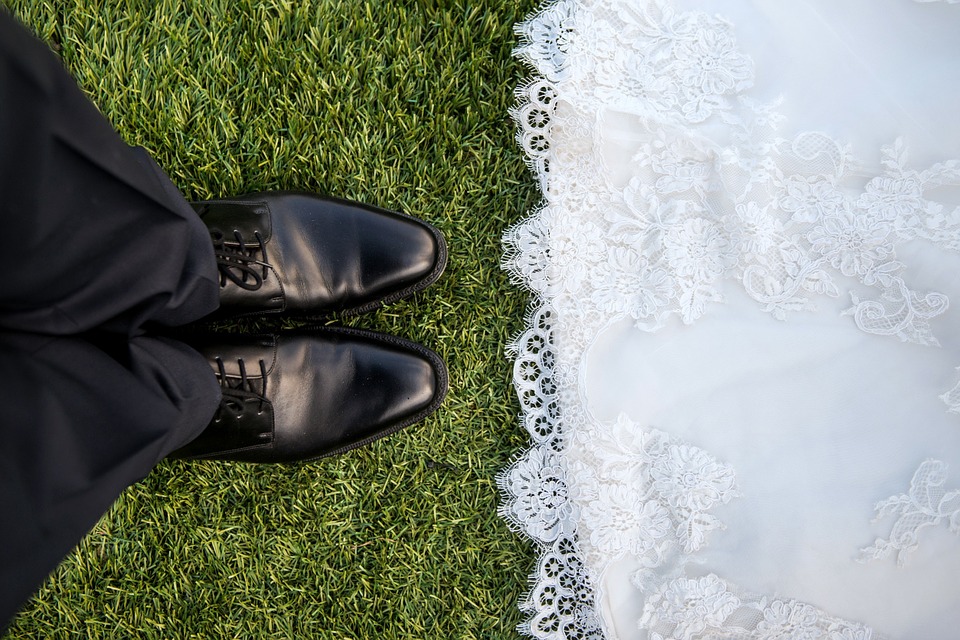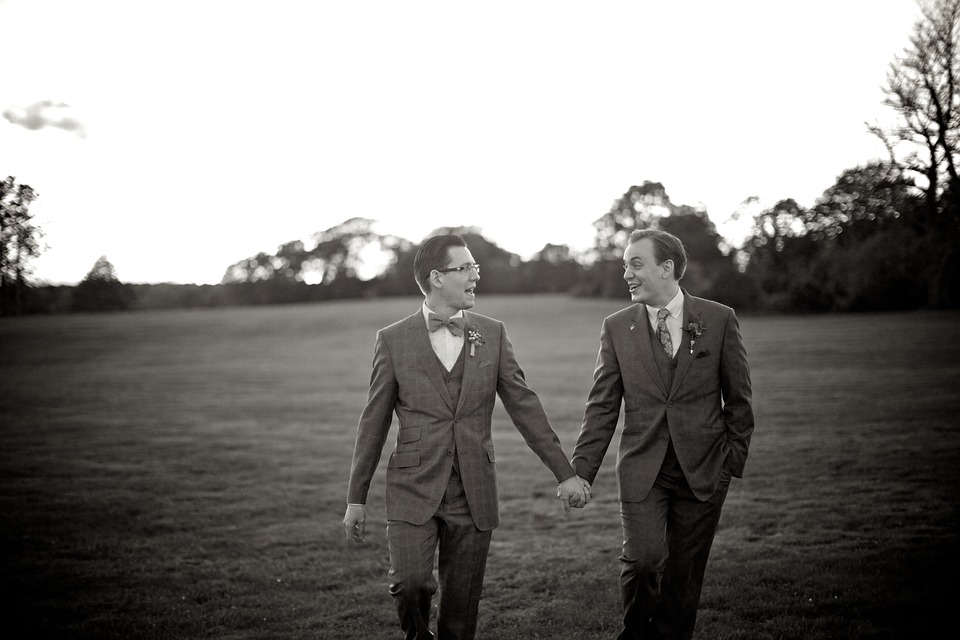Marriage Law and Civil Partnership Law - UK
Have you ever wondered how old you have to be to get married? Or what the difference between a marriage and a civil partnership is? Or even what are the rules around having more then one partner? This page is an overview of marriage and civil partnership law in the UK.
Marriage is about love and commitment. It is found in many of the major world religions and each have their own customs and rules around it. But what does the law say about marriage and civil partnerships in the UK? Read on to find out.


Age you can get married:
- 16 - with parents or guardians permission (England, Wales and Northern Ireland)
- 16 - without parent or guardians permission (Scotland)
- 18 - without parent or guardians permission (England, Wales and Northern Ireland)
Other prerequisites:
- Free to marry or form a civil partnership (not already married)
- Not closely related
- Child or adopted child
- Parent or adopted parent
- Brother or sister including half-brother or sister
- A parent’s brother or sister, including half-brother and half-sister
- Grandparent
- Grandchild
- A brother’s or sister’s (including half) child
Engagements
Engagements have limited status in law and can be entered into and broken without any legal impact. They can be used as evidence for intent to marry for legal cases such as immigration.
Same sex couples can:
- Form a civil partnership (England, Scotland, Wales and Northern Ireland)
- Get married (England, Scotland, and Wales)
- Convert a civil partnership into a marriage (England, Scotland, and Wales)
Only same sex couples can form a civil partnership (although this may be changing as a heterosexual couple recently won their right to a civil partnership: https://www.bbc.co.uk/news/uk-44627990


People who are Transgender
If a person has been granted a Gender Recognition Certificate then they can enter into a marriage or civil partnership as their recognised gender. This must also follow the law as outlined above. If they have not been granted a Gender Recognition Certificate then they can only get married or enter into a civil partnership as the gender assigned to them at birth. For more on Gender Recognition Certificates visit: https://www.gov.uk/apply-gender-recognition-certificate
Applying for a Gender Recognition Certificate whilst Married or in a Civil Partnership
You can stay married whilst applying for a gender recognition certificate (unless your marriage is registered under the law of Northern Ireland). Both partners must agree to stay married with a written declaration. If you or your partner don’t wish to stay married you will be issued an interim certificate. This can be used as grounds to end the marriage.
In England and Wales you can only get the full certificate once the marriage has been ended or if both partners have signed to say they wish to stay in the marriage.
If your marriage was registered in Scotland you can use your interim certificate to apply for a full certificate without ending the marriage.
You cannot stay in a civil partnership when applying for a gender recognition certificate as only people of the same gender can be in one (although this may be changing). However, you can convert your civil partnership into a marriage. This will need to be done before you apply for a gender recognition certificate.
Northern Ireland:
- Your marriage or civil partnership must have been registered in Northern Ireland to get an interim certificate
- Before you can apply for a full certificate you must end your marriage or civil partnership. Your interim certificate can be used as grounds to end it.
Polygamy, Polyandry and Bigamy
- Polygamy refers to the act of having more than one wife.
- Polyandry refers to the act of having more than one husband.
- Both are illegal in the UK and fall under the offence of bigamy.
Polygamous or polyandrous marriages which are conducted in the UK are not legal and are not recognised by law in the UK.
If a polygamous or polyandrous marriage is entered into by UK citizens it is also not deemed valid. It is illegal even if the marriage is entered into in a country where it is legal.

From Outside the UK
Polygamous or polyandrous marriages may be valid in the UK under these circumstances:
- All the people involved were permanently based in a country where polygamy and polyandry is legal
- They entered into the marriage in a country where it is also legal.
This is because the government don’t want to try a severe relationships which have been legal in other countries. This is not the same as them approving of those marriages.
A person cannot enter into a marriage in the UK if they are currently married to someone else. This is true even if that marriage was entered into in another country where polygamy or polyandry was legal.
There are specific laws around immigration, citizenship, social security and pensions for people in polygamous and polyandrous relationships. More information can be found here: http://researchbriefings.parliament.uk/ResearchBriefing/Summary/SN05051

Interracial and interfaith marriages and civil partnerships
There are no laws in the UK to prevent people of different faiths or races from marrying or having a civil partnership.
Marriage Law and Civil Partnership Law - UK
Have you ever wondered how old you have to be to get married? Or what the difference between a marriage and a civil partnership is? Or even what are the rules around having more then one partner? This page is an overview of marriage and civil partnership law in the UK.
Marriage is about love and commitment. It is found in many of the major world religions and each have their own customs and rules around it. But what does the law say about marriage and civil partnerships in the UK? Read on to find out.

Age you can get married:
- 16 - with parents or guardians permission (England, Wales and Northern Ireland)
- 16 - without parent or guardians permission (Scotland)
- 18 - without parent or guardians permission (England, Wales and Northern Ireland)
Other prerequisites:
- Free to marry or form a civil partnership (not already married)
- Not closely related
- Child or adopted child
- Parent or adopted parent
- Brother or sister including half-brother or sister
- A parent’s brother or sister, including half-brother and half-sister
- Grandparent
- Grandchild
- A brother’s or sister’s (including half) child
Engagements
Engagements have limited status in law and can be entered into and broken without any legal impact. They can be used as evidence for intent to marry for legal cases such as immigration.

Same sex couples can:
- Form a civil partnership (England, Scotland, Wales and Northern Ireland)
- Get married (England, Scotland, and Wales)
- Convert a civil partnership into a marriage (England, Scotland, and Wales)
Only same sex couples can form a civil partnership (although this may be changing as a heterosexual couple recently won their right to a civil partnership: https://www.bbc.co.uk/news/uk-44627990

People who are Transgender
If a person has been granted a Gender Recognition Certificate then they can enter into a marriage or civil partnership as their recognised gender. This must also follow the law as outlined above. If they have not been granted a Gender Recognition Certificate then they can only get married or enter into a civil partnership as the gender assigned to them at birth. For more on Gender Recognition Certificates visit: https://www.gov.uk/apply-gender-recognition-certificate
Applying for a Gender Recognition Certificate whilst Married or in a Civil Partnership
You can stay married whilst applying for a gender recognition certificate (unless your marriage is registered under the law of Northern Ireland). Both partners must agree to stay married with a written declaration. If you or your partner don’t wish to stay married you will be issued an interim certificate. This can be used as grounds to end the marriage.
In England and Wales you can only get the full certificate once the marriage has been ended or if both partners have signed to say they wish to stay in the marriage.
If your marriage was registered in Scotland you can use your interim certificate to apply for a full certificate without ending the marriage.
You cannot stay in a civil partnership when applying for a gender recognition certificate as only people of the same gender can be in one (although this may be changing). However, you can convert your civil partnership into a marriage. This will need to be done before you apply for a gender recognition certificate.
Northern Ireland:
- Your marriage or civil partnership must have been registered in Northern Ireland to get an interim certificate
- Before you can apply for a full certificate you must end your marriage or civil partnership. Your interim certificate can be used as grounds to end it.

Polygamy, Polyandry and Bigamy
- Polygamy refers to the act of having more than one wife.
- Polyandry refers to the act of having more than one husband.
- Both are illegal in the UK and fall under the offence of bigamy.
Polygamous or polyandrous marriages which are conducted in the UK are not legal and are not recognised by law in the UK.
If a polygamous or polyandrous marriage is entered into by UK citizens it is also not deemed valid. It is illegal even if the marriage is entered into in a country where it is legal.
From Outside the UK
Polygamous or polyandrous marriages may be valid in the UK under these circumstances:
- All the people involved were permanently based in a country where polygamy and polyandry is legal
- They entered into the marriage in a country where it is also legal.
This is because the government don’t want to try a severe relationships which have been legal in other countries. This is not the same as them approving of those marriages.
A person cannot enter into a marriage in the UK if they are currently married to someone else. This is true even if that marriage was entered into in another country where polygamy or polyandry was legal.
There are specific laws around immigration, citizenship, social security and pensions for people in polygamous and polyandrous relationships. More information can be found here: http://researchbriefings.parliament.uk/ResearchBriefing/Summary/SN05051

Interracial and interfaith marriages and civil partnerships
There are no laws in the UK to prevent people of different faiths or races from marrying or having a civil partnership.
